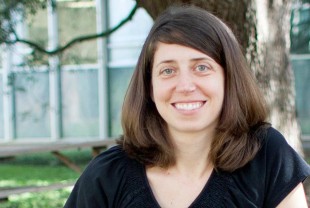David Ruth
713-348-6327
david@rice.edu
Jade Boyd
713-348-6778
jadeboyd@rice.edu
Rice University scientist to co-author U.N. biodiversity report
Ecologist Amy Dunham will assess human impact of African biodiversity trends
HOUSTON — (Aug. 3, 2015) — A United Nations panel has selected Rice University ecologist Amy Dunham as a lead author for a report on evaluating relationships of biodiversity, ecosystem services and human livelihoods in Africa. The study is part of a three-year effort to assess the overall health of Earth’s environment and its relevance to human development and wellbeing.
The U.N.’s Intergovernmental Science-Policy Platform on Biodiversity and Ecosystem Services (IPBES) selected Dunham, an assistant professor of biosciences, for an assessment team that will gather credible scientific information and report on the state of biodiversity for world decision-makers.
“I am honored to be part of this international team,” said Dunham, a specialist in tropical forest ecosystems who was nominated by the State Department based on her research on human impacts on biodiversity and ecosystem processes in Africa and Madagascar.
“It’s exciting to be part of this, but it is also a huge responsibility to be given the task of synthesizing and communicating science to inform policymaking in such a broad context,” Dunham said.
The assessment team she will join includes ecologists, biologists and social scientists. She will serve as both an expert researcher and lead author for IPBES’ assessment report on the status and trends of biodiversity and ecosystem services as they relate to human livelihoods in Africa. The report will contribute to the platform’s goal of assessing both the state and implications of the world’s biodiversity crisis by 2018.
“Achieving environmental sustainability is one of the biggest challenges humanity has ever encountered,” said Dunham, who begins her work on the platform this week in Pretoria, South Africa, at a meeting of first-author experts from 30 nations.
“I hope that strengthening the science-policy interface at such a large scale will enable our work to bring us closer to finding solutions to the global biodiversity crisis that threatens human livelihoods,” Dunham said.
She said assessing the magnitude, dynamics and implications of the global biodiversity crisis is an important step on the path to a solution. Accurate assessments are especially urgent in regions such as Africa, where millions of people rely directly on local ecosystems for food, fuel and income.
IPBES, an independent body open to all UN members, was jointly established by more than 100 governments in 2012 in response to concerns about the lack of policy-relevant information to tackle threats to biodiversity. The platform represents a global collaboration on biodiversity and ecosystem services that aims to provide a better link between science and policy regarding the conservation of global biodiversity, human well-being and sustainable development.
-30-
https://news2.rice.edu/files/2015/07/150803_DUNHAM-b4.jpg
CAPTION: Amy Dunham
CREDIT: BioSciences@Rice
This release can be found online at news-network.rice.edu/news.
Follow Rice News and Media Relations via Twitter @RiceUNews
Located on a 300-acre forested campus in Houston, Rice University is consistently ranked among the nation’s top 20 universities by U.S. News & World Report. Rice has highly respected schools of Architecture, Business, Continuing Studies, Engineering, Humanities, Music, Natural Sciences and Social Sciences and is home to the Baker Institute for Public Policy. With 3,888 undergraduates and 2,610 graduate students, Rice’s undergraduate student-to-faculty ratio is just over 6-to-1. Its residential college system builds close-knit communities and lifelong friendships, just one reason why Rice is highly ranked for best quality of life by the Princeton Review and for best value among private universities by Kiplinger’s Personal Finance. To read “What they’re saying about Rice,” go here.


